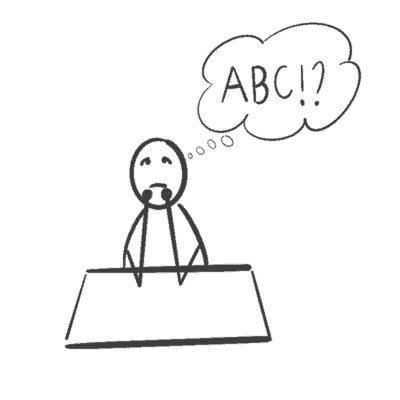Are you also finding it difficult to talk about dyslexia with your child? And making your child realize that they are good enough?
You can start a really good conversation between you and your dyslexic child, although there are often many thoughts and feelings at stake for both you and the child.
DYSLEXIA INFLUENCES YOUR CHILD’S THOUGHTS AND EMOTIONS
A crucial part of making your child accept their dyslexia is ensuring that the thoughts and emotions about it do not hinder your child’s passion for learning and spending time with their peers.
A good talk can open up on these topics. By expressing your thoughts and feelings, both you and your child can see what is at stake when the letters are just lines on paper.
Many are often worried about feeling different from their peers and siblings.
A lot of dyslexic people also feel dumb when they cannot complete their homework as they want to.
But no one with dyslexia is exactly the same. Your child’s thoughts and emotions are not a given.
Therefore, it is essential for them to express these things so you are closer to understanding what dyslexia is and to making it easier to accept the situation.
My child is dyslexic
“What is dyslexia, and what does it mean for my child?” Have you also been searching for answers to that?
Understand your dyslexic child
It can be challenging to be a parent and help with the homework without getting frustrated.
Use the apps and tools
Have you also thought about what apps and programs that are best? Then your child could get their homework done without issues…
YOU ARE CRUCIAL IN THE CONVERSATION WITH YOUR CHILD
Either you do not have dyslexia as a parent and may find it difficult to resonate with your child’s challenges, or you have dyslexia but may find it difficult to talk about the annoying letters because that brings up your own bad experiences as a dyslexic person.
Whether you have dyslexia or not, you can be an obstacle to your child’s being able to talk freely about difficult thoughts and feelings. Just because you are who you are.
We all know that our parents said “smart” things to us when we were children, but we did not want to listen just because it was our parents saying it.
Actually, I have to admit that I still don’t listen when my mother offers me advice. However, I can listen when the advice comes from other people.
Therefore, I have the following tips for you when you have a talk with your child about dyslexia:
1 – Acknowledge your child’s feelings and thoughts
You should do this even though your child acts out because of their feelings, which you do not understand.
For instance, your child might be making trouble, withdrawing, or procrastinating when it is time to do homework.
Your child often has their own (often unconscious) ways of trying to escape from situations that create negative thoughts and emotions.
If you acknowledge the feelings behind your child’s actions, it is easier to start a positive conversation.
2 – Put dyslexia away from your child
Use others’ stories to talk about dyslexia. But remember that your child should be able to mirror themselves in the stories.
It is not always a good idea to find a catalog of famous dyslexic people who have lives that are far from what your child is living through.
Instead, find the closer stories. For instance, you can talk about other dyslexic people in the family, who have done well without being blocked by the letters.
It is often easier to talk about other people’s challenges, and this can be a way to talk about the things that give your child negative thoughts and feelings.
It also makes it easier for you to be the listening and understanding parent instead of the one who gives a lot of “good” advice and admonitions that your child shuts out straight away.
If you do not have any dyslexic family members or friends that your child can see themselves in, you can also find stories from other dyslexic people that host talks. That is often a beneficial way to gain insight into other dyslexic people’s lives.
3 – Give your child more knowledge
A third important element in the journey toward your child’s acceptance of their dyslexia is knowing what it is (and isn’t).
This demystifies dyslexia and gives your child an insight into what is at stake when the letters are frustrating them.
For instance, dyslexia is inherited and means that you may have trouble converting letters to sounds. It is not a disease and does not make you stupid.
You can easily provide your child with knowledge about what dyslexia is. There are many ways to explain it, and I have described some of them for you here.
The dyslexic brain
Have you also been wondering if there is something wrong with your dyslexic child’s brain? That is, why the head cannot comprehend those pesky letters.
Accepting the dyslexia
Is your child also finding it difficult to talk about their thoughts and emotions when the letters are teasing them?
Motivation to read
Would you also like to motivate your child to read more? And is it difficult to find the right “carrot”?
FROM 71 IN DICTATION TO EDUCATION… AND NOW AN AUTHOR
That is the journey I’ve been through.
My life actually started with me having issues with my speech (that is not abnormal for dyslexic children).
Therefore, I went to a kindergarten for special needs children with five other kids, who also had trouble getting the words out. I was a happy boy here because I felt just like my playmates.
My challenges really started in school, where I felt different. The letters did not make any sense to me while my peers could read interesting books and write long essays.
I ended up with 71 mistakes out of 92 in dictation in 9th grade, and I was not predicted to have a great future in the education system.
But in the 10th grade, I accepted that I was dyslexic. And so what?
I was good at many other things. I was good at asking for help with the things I wasn’t good at.
I managed to get an education, and since then I’ve written several books for dyslexic people and their teachers and parents.
When I tell my story in schools and libraries, each time children will come up to me afterward and say, “That is exactly how I feel. Now I am not alone anymore.”
Often, the parents will also come up and say that they now have a story they can use to talk about dyslexia with their children.
You are welcome to use my story as an inspiration to get the conversation going with your child.
I hope you will have a wonderful talk.
Jesper Sehested
Dyslexic, author, speaker and mentor







